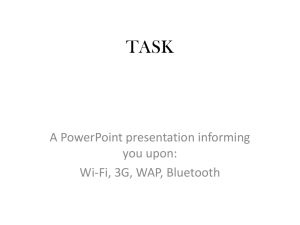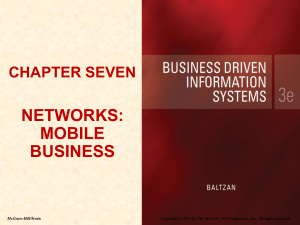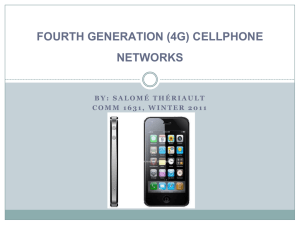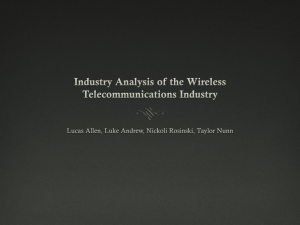Wireless Media Streaming
advertisement
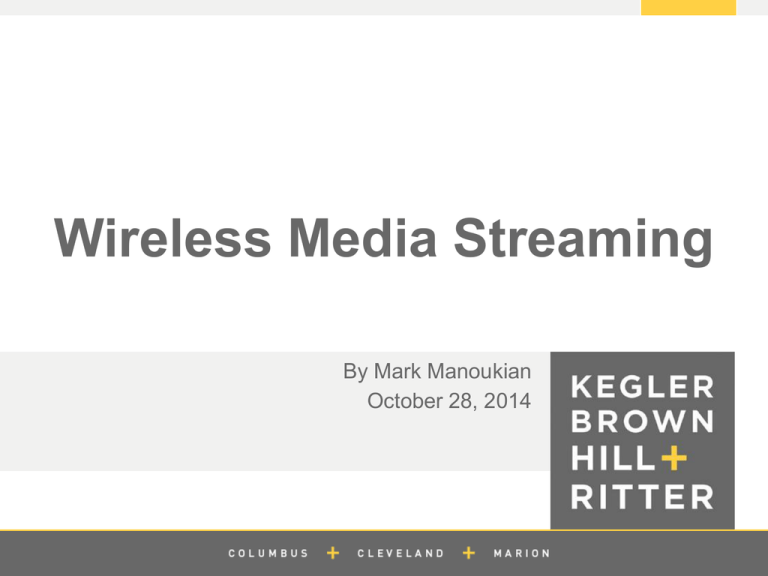
z Wireless Media Streaming By Mark Manoukian October 28, 2014 z Mark Manoukian + I’m the I.T. Director at Kegler, Brown, Hill & Ritter in Columbus, OH. I’ve been here for over 20 years. + Regular ILTA volunteer contributor. + Member of the Emerging Tech steering committee. z Solutions + Airplay by Apple + Airmedia by Crestron + Screencast AV by Belkin + Chromecast by Google + Avior HD by IOGear + Miracast, A Wi-Fi Alliance Standard + Push2TV, A Miracast Receiver + WiDi (Rhymes with Why Die), An Intel Wireless Media Standard z Airplay by Apple + Available on… + + + + Personal experience… + + + + + Apple Devices Media devices for which the manufacturer has licensed Airplay. Windows devices. NOT Easy, although I find myself having to reboot my router. I use this at home with my iPad. No experience with this at work, but we will implement. Latency is good to great, meaning high motion video is acceptable. Costs + $100 for Apple TV + Apple Device "AirPlay logo" by Apple product presentation. Licensed under Fair use of copyrighted material in the context of AirPlay via Wikipedia http://en.wikipedia.org/wiki/File:AirPlay_logo.png#mediaviewer/File:Air Play_logo.png z Crestron Airmedia + Perhaps the most platform agnostic solution. Small applets that are quickly installed are available through… Any OS – Android, iOS, Windows. + Applet is acquired through any browser – Chrome, IE, Safari. + + Expensive: $1300 + Personal experience: + + + Incredibly easy for the end user. Limited to bench testing, but worked extremely well. Enterprise-Grade: + + Setup is a little more involved in that it does not have a wireless NIC, but rather connects by Ethernet to the wireless network. Can be administered remotely. z Screencast AV by Belkin + Nothing to install on the PC. This is a virtual HDMI cable. + Latency is outstanding. High motion video is acceptable. + This solution is a transmitter that one connects to the HDMI port of their PC, and a receiver that one connects to the flat-screen display. + The transmitter requires power. + Super easy for anybody that is capable of connecting an HDMI cable. + Reminder: HDMI only. + The transmitter has four HDMI inputs, meaning that if you have a display lacking enough inputs then this solves your problem. + This solution operates completely independently of the NIC or WiFi. z Chromecast by Google + Simple if you have Chrome and Chromecast already installed. + Requires Google Chrome browser. + At $35 it is dirt cheap and it includes a 6 ft. HDMI cable. (By comparison, a six foot cable at BestBuy costs $25.) "Chromecast dongle" by EricaJoy - Flickr: Chromecast. Licensed under Creative Commons Attribution-Share Alike 2.0 via Wikimedia Commons http://commons.wikimedia.org/wiki/File:Chromecast_dongle.jpg#media viewer/File:Chromecast_dongle.jpg z Avior Wireless HD Kit by IOGear + + This is another transmitter\receiver solution. Pros: + + + + + + Accepts wide variety of inputs – e.g. HDMI, VGA, DVI (with DVI to VGA adapter), separate audio pins. Outputs include component and S-Video, which are particularly useful for connecting to a projector. The transmitter will broadcast to as many as four receivers. Nothing to install. Not subject to wireless NIC or wireless network issues. Cons: + + + + Calls to the help desk “I’ve connected to the thing-a-majig with the grey cable, and pushed the button until the HDMI…” Cost is $450-ish. May be in limited supply. Requires power for the transmitter. z Miracast + Miracast is wireless multimedia streaming standard promulgated by the Wi-Fi alliance. + There are many recievers that claim Miracast compliance. + Results vary… widely. + + + Some devices simply never accept the connection – e.g. my Toshiba Symbio Blu-Ray player. Some devices accept connections from Android devices – e.g. my Panasonic Blu-Ray BDT330 player. One device accepts connections from Android and Windows devices – you’ll have to wait for the next slide. + The holy grail… a Blu-Ray player with quality Miracast. Until then… + Microsoft’s impending dongle is a Miracast device. z Push2TV by NetGear + Works really well with Android and Windows 8.1. + Lists at about $60. + Smaller than a deck of cards, but much lighter. + Draws power through a USB port, meaning that if your flat panel has a USB port you can piggy back the power for the Push2TV device off of the TV. + Firmware makes a big difference, check and update the firmware. + Latency is meh. High motion video and people subject to motion sickness are a bad mix. + It is dependent on the wireless NIC. If there are any problems with the wireless NIC then they might make themselves known. z Wi-Di + This is an Intel standard. + It has been subsumed into Miracast. (?) + My advice: Avoid loading up any Wi-Di drivers that don’t land on your device by way of automatic updates. Additional Wi-Di drivers seem to muck up the wireless NIC in my experience. "Intel WiDi logo" by http://www.flickr.com/photos/intelfreepress/8346399311/. Licensed under Fair use of copyrighted material in the context of WiDi via Wikipedia http://en.wikipedia.org/wiki/File:Intel_WiDi_logo.gif#mediavie wer/File:Intel_WiDi_logo.gif z Notes on Microsoft Windows + Microsoft’s new dongle is based on Miracast. + Microsoft attempted to bake in addition wireless streaming functionality in Windows 8. It failed. + …but succeeded in Windows 8.1. It’s as easy as 1-2-3… z Questions?
